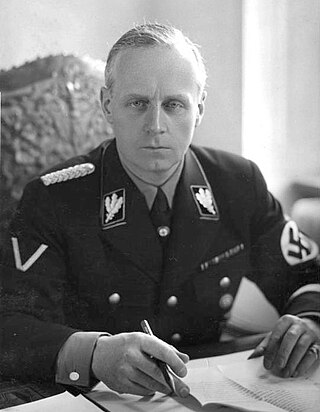
Ulrich Friedrich-Wilhelm Joachim von Ribbentrop was a German politician and diplomat who served as Minister of Foreign Affairs of Nazi Germany from 1938 to 1945.

The Axis powers, originally called the Rome–Berlin Axis and also Rome–Berlin–Tokyo Axis, was a military coalition that initiated World War II and fought against the Allies. Its principal members were Nazi Germany, the Kingdom of Italy and the Empire of Japan. The Axis were united in their far-right positions and general opposition to the Allies, but otherwise lacked comparable coordination and ideological cohesion.

Christian X was King of Denmark from 1912 until his death in 1947. He was also the only King of Iceland as Kristján X, holding the title as a result of the personal union between Denmark and independent Iceland between 1918 and 1944.

The Munich Agreement was an agreement concluded at Munich on 30 September 1938, by Nazi Germany, Great Britain, the French Republic, and Fascist Italy. The agreement provided for the German annexation of part of Czechoslovakia called the Sudetenland, where more than three million people, mainly ethnic Germans, lived. The pact is also known in some areas as the Munich Betrayal, because of a previous 1924 alliance agreement and a 1925 military pact between France and the Czechoslovak Republic.

Konstantin Hermann Karl Freiherr von Neurath was a German diplomat and Nazi war criminal who served as Foreign Minister of Germany between 1932 and 1938.
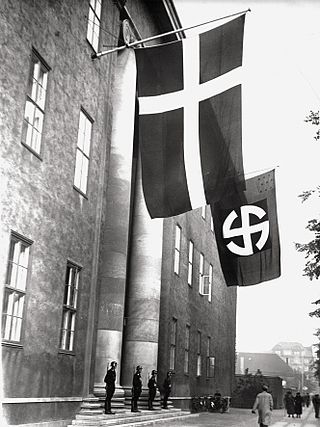
At the outset of World War II in September 1939, Denmark declared itself neutral, but that neutrality did not prevent Nazi Germany from occupying the country almost immediately after the outbreak of war; the occupation lasted until Germany's defeat. The decision to occupy Denmark was taken in Berlin on 17 December 1939. On 9 April 1940, Germany occupied Denmark in Operation Weserübung. The Danish government and king functioned in a relatively normal manner until 29 August 1943, when Germany placed Denmark under direct military occupation, which lasted until the Allied victory on 5 May 1945. Contrary to the situation in other countries under German occupation, most Danish institutions continued to function relatively normally until 1945. Both the Danish government and king remained in the country in an uneasy relationship between a democratic and a totalitarian system until 1943 when the Danish government stepped down in protest against German demands that included instituting the death penalty for sabotage.

The Protectorate of Bohemia and Moravia was a partially-annexed territory of Nazi Germany that was established on 16 March 1939 after the German occupation of the Czech lands. The protectorate's population was mostly ethnic Czech.
A plenipotentiary is a diplomat who has full powers—authorization to sign a treaty or convention on behalf of a sovereign. When used as a noun more generally, the word can also refer to any person who has full powers. As an adjective, it describes something which confers full powers, such as an edict or an assignment.

Otto Friedrich Abetz was a German diplomat, a Nazi official and a convicted war criminal during World War II.
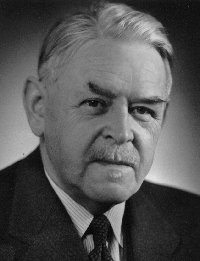
Vilhelm Buhl was Prime Minister of Denmark from 4 May 1942 to 9 November 1942 as head of the Unity Government during the German occupation of Denmark of World War II, until the Nazis ordered him removed. He was Prime Minister again from 5 May 1945 to 7 November 1945 as head of a unity government after the liberation of Denmark by the British Field Marshal Montgomery.

Karl Rudolf Werner Best was a German jurist, police chief, SS-Obergruppenführer, Nazi Party leader, and theoretician from Darmstadt. He was the first chief of Department 1 of the Gestapo, Nazi Germany's secret police, and initiated a registry of all Jews in Germany. As a deputy of SS-Obergruppenführer Reinhard Heydrich, he organized the World War II SS-Einsatzgruppen, paramilitary death squads that carried out mass-murder in Nazi-occupied territories.

The Federal Foreign Office, abbreviated AA, is the foreign ministry of the Federal Republic of Germany, a federal agency responsible for both the country's foreign policy and its relationship with the European Union. It is a cabinet-level ministry. Since December 2021, Annalena Baerbock has served as Foreign Minister, succeeding Heiko Maas. The primary seat of the ministry is at the Werderscher Markt square in the Mitte district, the historic centre of Berlin.
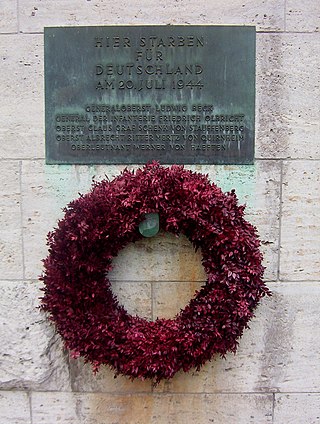
Many individuals and groups in Germany that were opposed to the Nazi regime engaged in resistance, including assassination attempts on Adolf Hitler or by overthrowing his regime.

Cécil Karl-August Timon Ernst Anton von Renthe-Fink was a German diplomat. He was Plenipotentiary of Denmark from 9 April 1940 until 1942.
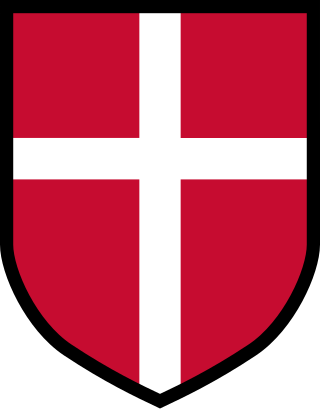
Free Corps Denmark was a unit of the Waffen-SS during World War II consisting of collaborationist volunteers from Denmark. It was established following an initiative by the National Socialist Workers' Party of Denmark (DNSAP) in the immediate aftermath of the German invasion of the Soviet Union in June 1941 and subsequently endorsed by Denmark's government which authorised officers of the Royal Danish Army to enlist in the unit. It participated in fighting on the Eastern Front and was disbanded in 1943. During the course of the war, approximately 6,000 Danes joined the corps, including 77 officers of the Royal Danish Army.

The Axis leaders of World War II were important political and military figures during World War II. The Axis was established with the signing of the Tripartite Pact in 1940 and pursued a strongly militarist and nationalist ideology; with a policy of anti-communism. During the early phase of the war, puppet governments were established in their occupied nations. When the war ended, many of them faced trial for war crimes. The chief leaders were Adolf Hitler of Nazi Germany, Benito Mussolini of Fascist Italy, and Hirohito of Imperial Japan. Unlike what happened with the Allies, there was never a joint meeting of the main Axis heads of government, although Mussolini and Hitler met on a regular basis.

The Quisling regime, or Quisling government are common names used to refer to the fascist collaboration government led by Vidkun Quisling in German-occupied Norway during the Second World War. The official name of the regime from 1 February 1942 until its dissolution in May 1945 was Den nasjonale regjering. Actual executive power was retained by the Reichskommissariat Norwegen, headed by Josef Terboven.

Vatican City pursued a policy of neutrality during World War II, under the leadership of Pope Pius XII. Although the city of Rome was occupied by Germany from September 1943 and the Allies from June 1944, Vatican City itself was not occupied. The Vatican organised extensive humanitarian aid throughout the duration of the conflict.

Operation Weserübung was the invasion of Denmark and Norway by Nazi Germany during the Second World War and the opening operation of the Norwegian Campaign.
Events in the year 1938 in Germany.


















